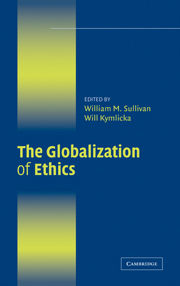Book contents
- Frontmatter
- Contents
- Contributors
- Acknowledgments
- 1 Introduction: The Globalization of Ethics
- 2 Global Ethics and the International Law Tradition
- 3 Morality and Universality in Jewish Thought
- 4 Globalization and Christian Ethics
- 5 Buddhism and the Globalization of Ethics
- 6 Muslim Perspectives on Global Ethics
- 7 Confucianism: Ethical Uniformity and Diversity
- 8 Natural Law, Common Morality, and Particularity
- 9 Liberalism and the Globalization of Ethics
- 10 Feminist Perspectives on a Planetary Ethic
- 11 Ethical Universalism and Particularism: A Comparison of Outlooks
- Appendix: Key Documents on Global Ethics
- Bibliography
- Index
9 - Liberalism and the Globalization of Ethics
Published online by Cambridge University Press: 03 September 2009
- Frontmatter
- Contents
- Contributors
- Acknowledgments
- 1 Introduction: The Globalization of Ethics
- 2 Global Ethics and the International Law Tradition
- 3 Morality and Universality in Jewish Thought
- 4 Globalization and Christian Ethics
- 5 Buddhism and the Globalization of Ethics
- 6 Muslim Perspectives on Global Ethics
- 7 Confucianism: Ethical Uniformity and Diversity
- 8 Natural Law, Common Morality, and Particularity
- 9 Liberalism and the Globalization of Ethics
- 10 Feminist Perspectives on a Planetary Ethic
- 11 Ethical Universalism and Particularism: A Comparison of Outlooks
- Appendix: Key Documents on Global Ethics
- Bibliography
- Index
Summary
Introduction: Many Liberalisms
When the words ‘liberal’ and ‘liberalism’ entered the broad political discourse of Europe in the first quarter of the nineteenth century, it was as terms of abuse; the association was with libertinism – when Don Giovanni gives the toast ‘Viva la libertà’ in the Finale to Act I of Mozart's opera it seems unlikely he had any specifically political principle in mind. Soon, as is often the way, the terms came to be accepted by those who advocated a programme of personal freedom that encompassed civil and political rights for the individual instead of, or sometimes perhaps as well as, the liberation from conventional sexual mores toasted by the Don. This programme remains the core of the liberal conception of the world. In the helpful formulation of Will Kymlicka:
Liberals demand a substantial realm of personal freedom – including freedom of conscience, speech, association, occupation, and, more recently, sexuality – which the state should not intrude upon except to protect others from harm.
In pursuit of this realm of personal freedom, liberals generally favour constitutional forms of government, the separation of powers and the rule of law, with representative, but not usually direct, democracy, and are broadly sceptical of accounts of politics that are based around the promotion of any particular conception of the Good (except that conception of the Good that involves not having an overriding conception of the Good).
- Type
- Chapter
- Information
- The Globalization of EthicsReligious and Secular Perspectives, pp. 151 - 170Publisher: Cambridge University PressPrint publication year: 2007
- 3
- Cited by

